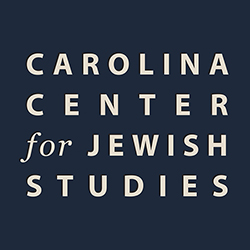Vision Statement
Jewish Studies and the Carolina Difference
Updated May 2020
Initial Draft by Jonathan M. Hess, 2013
When the Carolina Center for Jewish Studies was created in 2003, we had a clear sense that building a program in Jewish Studies at Carolina would be different. For us, it represented an opportunity to envision an academic program that would be far more integrated into the liberal arts than many Jewish Studies programs created at peer institutions. Jewish Studies is a highly interdisciplinary field that concerns itself with the history, culture, and religious traditions of Jews in their interactions with others from the ancient period to the present. It draws faculty strength from religious studies, history, languages and literatures, archaeology, political science and other disciplines in the humanities and social sciences. Jewish Studies thus exemplifies what a liberal arts education can be in the 21st century.
Building Jewish Studies at Carolina, 2003–2013
The strategic goal guiding our first decade has been to assemble a comprehensive faculty in Jewish Studies through a combination of private giving and state support. Of the more than $15 million the Center has raised to date, the lion’s share has gone to professorship funds, and the College of Arts and Sciences now boasts eight endowed professorships in Jewish history and culture, five of which have already been filled. All in all, since 2003, the College has recruited nine new Jewish Studies faculty in five different departments — this is a hiring rate that has no parallel anywhere in the nation. Creating a program from scratch has also enabled us to envision an academic curriculum that realizes Jewish Studies’ potential to be a model for liberal arts education. The new B.A. degree in Jewish Studies that the Department of Religious Studies rolled out in 2012 embodies the three-pronged approach— Jewish Studies as interdisciplinary, historical, and global—that makes Jewish Studies both such an exciting and innovative field of inquiry unto itself and an integrative force within the humanities.
Becoming a national leader, the next decade
Carolina does not aim to have the biggest Jewish Studies program offered by a major research university. But given the momentum we’ve developed for Jewish Studies at Carolina over the last decade, we can emerge as one of the leading Jewish Studies programs in the nation by embracing a different, broader approach. The goal for the next decade is to make the Carolina program a nationally recognized leader in the field. Achieving this depends on our ability to continue to develop innovative curricular offerings, to expand our network of faculty across disciplines, and to promote interdisciplinary research and teaching that reflect our global and historical approach. This in turn requires us:
1) to create graduate fellowships that enable departments in the College to recruit and support top graduate students who will eventually go on, as Carolina Ph.D.s, to teach and conduct research in Jewish Studies at other leading colleges and universities. Fund-raising goal: $4 million
2) to create three new faculty positions that enable us to address impending retirements while continuing to grow an interdisciplinary Jewish Studies faculty with strategic strengths. Fund-raising goal: $6 million
3) to create multiple endowment funds to support innovative research and teaching that inspire our students and help us retain and develop the strong faculty. Fund-raising goal: $2 million
We anticipate meeting these goals by building on the Center’s success in fund raising. In the next decade we plan to raise an additional $12 million to take the Jewish Studies program to the next stage. All of us at the Center, and the College of Arts and Sciences, look forward to partnering with alumni and friends to make the next 10 years as exceptional as the first 10 years.
